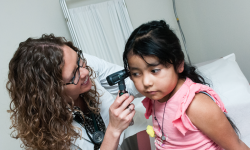Breast milk deliveries from Michigan prison benefit babies with moms behind bars

- Michigan moms in prison can now send breast milk to their babies through a state-funded program
- Mama’s Mobile Milk coordinates milk delivery and lactation support for incarcerated women
- Few states offer similar support for maternal bonding and infant nutrition behind bars
Inside Michigan’s only women’s prison, some mothers are finding a way to nurture their babies from behind bars — by pumping breast milk that’s hand-delivered to their children on the outside.
Volunteers with Mama’s Mobile Milk made their first prison pickup in April at the Huron Valley Correctional Facility in Ypsilanti.

The courier service, which has previously operated in Detroit and Flint, says that “human milk is medicine.” And advocates at the Michigan Breastfeeding Network say the program could "save lives."
“The infant didn’t do anything to be behind bars and still has) the right to access its first food, its first medicine, especially if that incarceration has compromised the infant's health,” said Angelene Love, transport coordinator for Mama’s Mobile Milk.
The organization is working with the Michigan Department of Corrections after Michigan lawmakers included $500,000 for the program in the state budget signed a year ago by Gov. Gretchen Whitmer.
The taxpayer funding covers the cost of constructing a lactation room at the women’s prison, supplying pumps and milk storage bags, along with staff to coordinate deliveries. Women can stay in the program for up to two years.
“We probably provide more lactation consults and education to folks who are incarcerated than we do in the community,” Love told Bridge Michigan, noting women are required to receive lactation education to participate.
A state spokesperson did not respond to requests for comment. However, in a recent report to the Legislature, the corrections department confirmed it had launched the initiative, sending milk from three incarcerated moms to their children living with grandmothers in Monroe, Saginaw and Gaugetown.
State Sen. Sue Shink, a Washtenaw County Democrat whose corrections budget subcommittee first approved the funding, praised the program.
“Because of Mama’s Mobile Milk, babies are able to drink their mother’s milk, and they not only receive nutrition from their mom but they’re also receiving the love of their mother pumping milk for them even though she can’t be with them,” Shink said.
“Breast milk is powerful whether the mom can be there or not.”
Medical experts have long touted the developmental benefits of breast milk, which provides vital nutrients while also fostering a deep emotional and psychological bond between mother and baby.
RELATED:
- Michigan Head Start, health programs scramble amid immigration crackdown
- Michigan getting millions more to aid opioid battle
- Families lament end of a 'lifeline’ for disabled Michigan children, adults
Fatty acids like docosahexaenoic acid (DHA) and arachidonic acid (ARA) found in breast milk can influence learning, memory and overall cognitive function. They are also considered the “building blocks” for brain tissue.
The World Health Organization recommends infants be exclusively breastfed for at least six months. Breastfed children tend to score higher on intelligence tests, have a lower risk of obesity and are less likely to later develop diabetes.
“Pumping is still a form of breastfeeding, you’re just doing it in a little bit of a different way,” said Love, who is helping coordinate milk deliveries for the new Michigan prison program. “They are also able to latch their baby at visit … if they have a caregiver who will bring their infant to the prison.”
Mama’s Mobile Milk traditionally works with families to transport milk to babies who have been separated from their mother due to a NICU hospitalization, temporary foster care or custodial issues.
The organization was started by lactation specialists Dr. Sekeita Lewis-Johnson and Mia Roetherford to serve women of color in metro Detroit and Flint. The program has since expanded to serve women in Jackson, Grand Rapids and Battle Creek.
Michigan isn’t the only state taking extra steps to help babies of incarcerated mothers.
In Oregon, the Northwest Mothers Milk Bank also provides lactation support to women in custody at the Coffee Creek Correctional Facility and transports milk to their infants through the Expression of Care Program.
Elsewhere, the Alabama Prison Project helps support women who are jailed or incarcerated to have a healthy birth and stay with their child, according to the organization’s website. Expectant mothers are provided doulas, weekly prenatal and postpartum group education, nutrition and lactation support.
See what new members are saying about why they donated to Bridge Michigan:
- “In order for this information to be accurate and unbiased it must be underwritten by its readers, not by special interests.” - Larry S.
- “Not many other media sources report on the topics Bridge does.” - Susan B.
- “Your journalism is outstanding and rare these days.” - Mark S.
If you want to ensure the future of nonpartisan, nonprofit Michigan journalism, please become a member today. You, too, will be asked why you donated and maybe we'll feature your quote next time!








